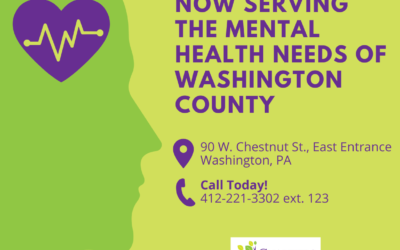Things Your Therapist Really Wants You to Know
Written By: Maria Wojtasik, MSCP, Chartiers Center Therapist
Mental Health Awareness Month is celebrated in May. The stigma around mental health and treatment has long existed. People hesitate to seek help or even talk about it with their loved ones for fear of being judged and facing unnecessary backlash.
In honor of Mental Health Awareness Month, Chartiers Center is happy and proud to share an article “Things Your Therapist Really Wants You to Know” written by Maria Wojtasik, Chartiers Center therapist.
We actually care about you! Okay, so look – sure, this is our job and yes, we do get paid, but we do it because we do truly care. Trust and believe that we worry about you. We think about you. We remember when you have a major life event coming up, and we hope it goes well. We see your strengths and the things that make you unique. We sometimes remember obscure things from sessions that took place a long time ago. When you’re happy, we feel it. When you’re sad – well, we feel that too. Even after our therapeutic relationship has ended, we’ll think of you and hope you’re living your best life.
We’re real people! I know, I know. Another shocker, right? Sometimes we say the wrong thing. Sometimes we don’t know what to say or we don’t have the right answers. Sometimes we have bad days and we make mistakes. Though we try, sometimes we don’t take our own advice. We aren’t magicians (well, maybe some of us are) and we can’t fix your problems (even though we would like to). We aren’t going to tell you what to do, but we will try to guide you so you can make good decisions for yourself.
Come as you are! Therapy is whatever you want it to be and we’re here for it! It’s not about our agenda or what we think you should work on. It’s about your goals. Just showing up for a session is productive. You don’t have to apologize for crying, getting upset, or being honest about your feelings (if you do, we’ll probably have to talk about that more in-depth). It’s okay if you’re having an “off” day or if you didn’t have time to wash your hair. You’re allowed to ask for a break or to change the subject. Don’t worry about acting or behaving in a certain way – we want you to be your honest, authentic self.
It’s okay to laugh sometimes. Not every session has to be heavy. There really is something to be said for the cliché saying of “Laughter is the best medicine.” Sometimes laughter is exactly what you need. Just because you’re laughing, doesn’t mean you aren’t working. Sometimes we are so problem-focused that we forget to focus on the positive things that happen, and those positive things are often just as important.
Please don’t self-diagnosis. Technology is all around us and our access to information is constantly growing. To that end, social media has been both a blessing and a curse. If I had a nickel for every time I’ve heard, “So I saw this TikTok and I think I have (insert diagnosis here),” I’d have a lot of nickels. Respectfully, just because you might like to have things a certain way, doesn’t mean you have obsessive compulsive disorder and just because you “zone out” sometimes, doesn’t mean you disassociate. It’s important to be aware of your symptoms, but please discuss these concerns with your provider.
You are far more than a diagnosis. Coming to therapy does not mean you are “weak” or “crazy.” Your experiences are your experiences regardless of what we call them. We could call them “purple cats,” but this wouldn’t change what they mean to you. Just because you’re given a diagnosis, it does not mean that’s who you are. You are a human with a beating heart! You are a partner, a friend, a sibling. You are strong, resilient, determined – you are a survivor. Your diagnosis does not define you!
Therapy is work. Ugh! Gross, right? Unfortunately, it’s true. The cliché saying “Things might get worse before they get better.” is also true. At the end of a session, you might think, “Wow! That was really productive!” and that’s great! However, it’s what you do in between sessions that counts the most. It’s how you use that new piece of knowledge or that new coping skill – saying “no” or setting boundaries. You have to be honest, vulnerable, and an active participant in your treatment. You have to sit with those uncomfortable feelings even if they hurt. You have to unlearn and relearn, and we are here to do it with you.
We are grateful for you. We are grateful for your trust. We are grateful that you share your best and worst moments with us. We’re grateful you feel you can tell us things you’ve never told anyone else. We’re grateful to be a part of your trials and triumphs. Sharing parts of your life with us is an absolute gift.

